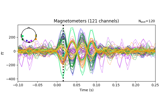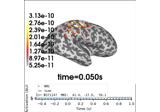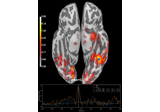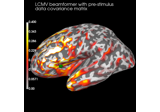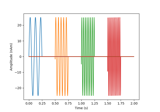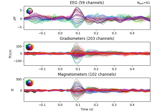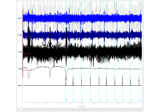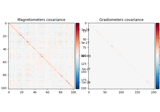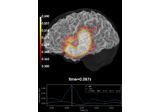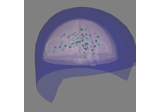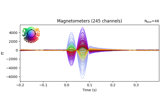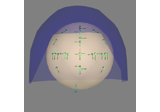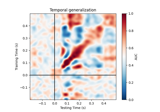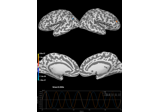mne.compute_covariance#
- mne.compute_covariance(epochs, keep_sample_mean=True, tmin=None, tmax=None, projs=None, *, on_few_samples='warn', method='empirical', method_params=None, cv=3, scalings=None, n_jobs=None, return_estimators=False, on_mismatch='raise', rank=None, verbose=None)[source]#
Estimate noise covariance matrix from epochs.
The noise covariance is typically estimated on pre-stimulus periods when the stimulus onset is defined from events.
If the covariance is computed for multiple event types (events with different IDs), the following two options can be used and combined:
either an Epochs object for each event type is created and a list of Epochs is passed to this function.
an Epochs object is created for multiple events and passed to this function.
Note
To estimate the noise covariance from non-epoched raw data, such as an empty-room recording, use
mne.compute_raw_covariance()instead.- Parameters:
- epochsinstance of
Epochs, orlistofEpochs The epochs.
- keep_sample_meanbool (default
True) If False, the average response over epochs is computed for each event type and subtracted during the covariance computation. This is useful if the evoked response from a previous stimulus extends into the baseline period of the next. Note. This option is only implemented for method=’empirical’.
- tmin
float|None(defaultNone) Start time for baseline. If None start at first sample.
- tmax
float|None(defaultNone) End time for baseline. If None end at last sample.
- projs
listofProjection|None(defaultNone) List of projectors to use in covariance calculation, or None to indicate that the projectors from the epochs should be inherited. If None, then projectors from all epochs must match.
- on_few_samples
str Can be ‘warn’ (default), ‘ignore’, or ‘raise’ to control behavior when there are fewer samples than channels, which can lead to inaccurate covariance or rank estimates.
New in v1.11.
- method
str|list|None(default ‘empirical’) The method used for covariance estimation. If ‘empirical’ (default), the sample covariance will be computed. A list can be passed to perform estimates using multiple methods. If ‘auto’ or a list of methods, the best estimator will be determined based on log-likelihood and cross-validation on unseen data as described in [1]. Valid methods are ‘empirical’, ‘diagonal_fixed’, ‘shrunk’, ‘oas’, ‘ledoit_wolf’, ‘factor_analysis’, ‘shrinkage’, and ‘pca’ (see Notes). If
'auto', it expands to:['shrunk', 'diagonal_fixed', 'empirical', 'factor_analysis']
'factor_analysis'is removed whenrankis not ‘full’. The'auto'mode is not recommended if there are many segments of data, since computation can take a long time.New in v0.9.0.
- method_params
dict|None(defaultNone) Additional parameters to the estimation procedure. Only considered if method is not None. Keys must correspond to the value(s) of
method. If None (default), expands to the following (with the addition of{'store_precision': False, 'assume_centered': True} for all methods except ``'factor_analysis'and'pca'):{'diagonal_fixed': {'grad': 0.1, 'mag': 0.1, 'eeg': 0.1, ...}, 'shrinkage': {'shrinkage': 0.1}, 'shrunk': {'shrinkage': np.logspace(-4, 0, 30)}, 'pca': {'iter_n_components': None}, 'factor_analysis': {'iter_n_components': None}}
- cv
int|sklearn.model_selectionobject (default 3) The cross validation method. Defaults to 3, which will internally trigger by default
sklearn.model_selection.KFoldwith 3 splits.- scalings
dict|None(defaultNone) Defaults to
dict(mag=1e15, grad=1e13, eeg=1e6). These defaults will scale data to roughly the same order of magnitude.- n_jobs
int|None The number of jobs to run in parallel. If
-1, it is set to the number of CPU cores. Requires thejoblibpackage.None(default) is a marker for ‘unset’ that will be interpreted asn_jobs=1(sequential execution) unless the call is performed under ajoblib.parallel_configcontext manager that sets another value forn_jobs.- return_estimatorsbool (default
False) Whether to return all estimators or the best. Only considered if method equals ‘auto’ or is a list of str. Defaults to False.
- on_mismatch
str What to do when the MEG<->Head transformations do not match between epochs. If “raise” (default) an error is raised, if “warn” then a warning is emitted, if “ignore” then nothing is printed. Having mismatched transforms can in some cases lead to unexpected or unstable results in covariance calculation, e.g. when data have been processed with Maxwell filtering but not transformed to the same head position.
- rank
None| ‘info’ | ‘full’ |dict This controls the rank computation that can be read from the measurement info or estimated from the data. When a noise covariance is used for whitening, this should reflect the rank of that covariance, otherwise amplification of noise components can occur in whitening (e.g., often during source localization).
NoneThe rank will be estimated from the data after proper scaling of different channel types.
'info'The rank is inferred from
info. If data have been processed with Maxwell filtering, the Maxwell filtering header is used. Otherwise, the channel counts themselves are used. In both cases, the number of projectors is subtracted from the (effective) number of channels in the data. For example, if Maxwell filtering reduces the rank to 68, with two projectors the returned value will be 66.'full'The rank is assumed to be full, i.e. equal to the number of good channels. If a
Covarianceis passed, this can make sense if it has been (possibly improperly) regularized without taking into account the true data rank.dictCalculate the rank only for a subset of channel types, and explicitly specify the rank for the remaining channel types. This can be extremely useful if you already know the rank of (part of) your data, for instance in case you have calculated it earlier.
This parameter must be a dictionary whose keys correspond to channel types in the data (e.g.
'meg','mag','grad','eeg'), and whose values are integers representing the respective ranks. For example,{'mag': 90, 'eeg': 45}will assume a rank of90and45for magnetometer data and EEG data, respectively.The ranks for all channel types present in the data, but not specified in the dictionary will be estimated empirically. That is, if you passed a dataset containing magnetometer, gradiometer, and EEG data together with the dictionary from the previous example, only the gradiometer rank would be determined, while the specified magnetometer and EEG ranks would be taken for granted.
The default is
None.New in v0.17.
New in v0.18: Support for ‘info’ mode.
- verbosebool |
str|int|None Control verbosity of the logging output. If
None, use the default verbosity level. See the logging documentation andmne.verbose()for details. Should only be passed as a keyword argument.
- epochsinstance of
- Returns:
- covinstance of
Covariance|list The computed covariance. If method equals
'auto'or is a list of str andreturn_estimators=True, a list of covariance estimators is returned (sorted by log-likelihood, from high to low, i.e. from best to worst).
- covinstance of
See also
compute_raw_covarianceEstimate noise covariance from raw data, such as empty-room recordings.
Notes
Baseline correction or sufficient high-passing should be used when creating the
Epochsto ensure that the data are zero mean, otherwise the computed covariance matrix will be inaccurate.Valid
methodstrings are:'empirical'The empirical or sample covariance (default)
'diagonal_fixed'A diagonal regularization based on channel types as in
mne.cov.regularize().
'shrinkage'Fixed shrinkage.
New in v0.16.
'ledoit_wolf'The Ledoit-Wolf estimator, which uses an empirical formula for the optimal shrinkage value [2].
'oas'The OAS estimator [3], which uses a different empricial formula for the optimal shrinkage value.
New in v0.16.
'shrunk'Like ‘ledoit_wolf’, but with cross-validation for optimal alpha.
'pca'Probabilistic PCA with low rank [4].
'factor_analysis'Factor analysis with low rank [5].
'ledoit_wolf'and'pca'are similar to'shrunk'and'factor_analysis', respectively, except that they use cross validation (which is useful when samples are correlated, which is often the case for M/EEG data). The former two are not included in the'auto'mode to avoid redundancy.For multiple event types, it is also possible to create a single
Epochsobject with events obtained usingmne.merge_events(). However, the resulting covariance matrix will only be correct ifkeep_sample_mean is True.The covariance can be unstable if the number of samples is small. In that case it is common to regularize the covariance estimate. The
methodparameter allows to regularize the covariance in an automated way. It also allows to select between different alternative estimation algorithms which themselves achieve regularization. Details are described in Engemann and Gramfort[1].For more information on the advanced estimation methods, see the sklearn manual.
References
Examples using mne.compute_covariance#
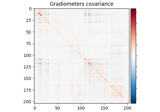
Compute evoked ERS source power using DICS, LCMV beamformer, and dSPM
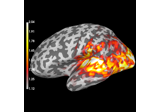
Compute source power estimate by projecting the covariance with MNE
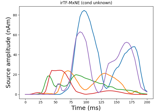
Compute iterative reweighted TF-MxNE with multiscale time-frequency dictionary
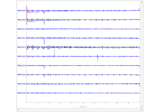
Plot sensor denoising using oversampled temporal projection

Source localization with MNE, dSPM, sLORETA, and eLORETA

EEG source localization given electrode locations on an MRI
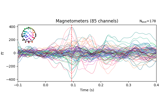
Preprocessing optically pumped magnetometer (OPM) MEG data
